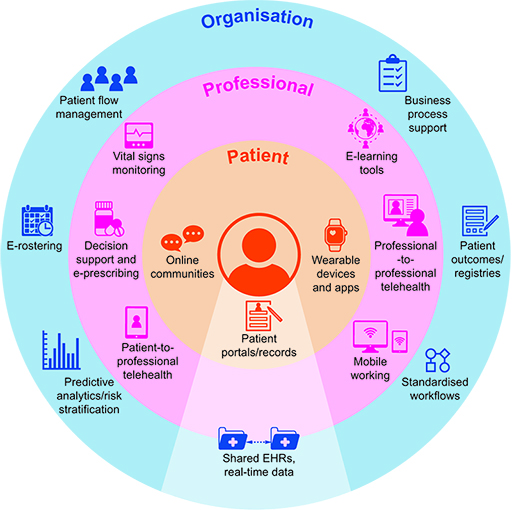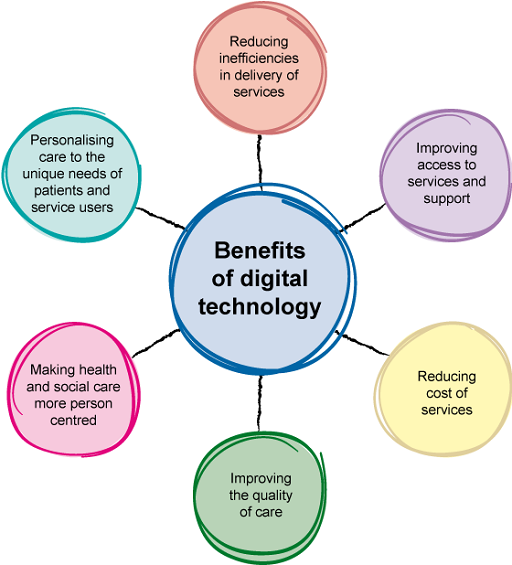3.1 Advantages of digital health and social care technology
Digital health and social care technologies have had an increasing impact since 2010, and from previous activities in this course you will see that in the UK, both nationally and locally, digital health technologies are now part of policy and strategy moving forward. The advantages of these technologies are wide-ranging and they can help to change and improve health and social care for service users, providers, people and professionals working in these sectors.
The next activity will encourage you to think about your experiences of digital health and social care technology and what advantages there might be.
Activity 4 Advantages of technology to you

Transcript: Video 3 The NHS at 70
DR KEVIN FONG: This, in many ways, is what you want from a 21st-century health service-- state-of-the-art technology, delivered the care that you need, where you need it, when you need it, with the right blend of expertise arriving as quickly as humanly possible. But new technology isn't just about shiny new kit. It's also changing how some of us use the NHS day in, day out.
[MUSIC PLAYING]
RYAN WILD: Ryan.
DR KEVIN FONG: Very nice to meet you.
RYAN WILD: Hi. Thanks for seeing me.
DR KEVIN FONG: Thanks very much for coming. Ryan Wild recently signed up to a new NHS online service, GP at hand.
RYAN WILD: I was really having difficulty getting a doctor's appointment. And when I did get an appointment, they kept getting canceled. So I just got really fed up. And I'd seen the advertisements for GP at hand. And I thought I'd give it a try.
[PHONE RINGING]
DR SAMGEE: Hi. Good afternoon. My name's Dr. Samgee. Welcome to GP at hand. How can I help today?
RYAN WILD: Hi there. Yeah, I've been having headaches quite regularly, and I'm a little bit concerned.
DR KEVIN FONG: The app offers online GP consultations around the clock, face-to-face appointments, and a symptom checker.
DR SAMGEE: Take care.
RYAN WILD: Yeah, you too. Thank you. Bye bye.
DR KEVIN FONG: Do you see that service in the same way that I guess some people would see delivery overall?
RYAN WILD: Absolutely.
DR KEVIN FONG: Absolutely suits you in that way?
RYAN WILD: Yeah, absolutely. I mean, I feel that it's a step towards the future.
[MUSIC PLAYING]
DR KEVIN FONG: GP at Hand, initially London based, is a partnership between the NHS and a private tech company Babylon.
ALI PARSA: I can see my GP in five minutes. Now pick up this phone, and call your GP. And see when can you see her. Right? That's the reality. We've made health care accessible for people in London within minute.
SPEAKER 1: It can't be used at the moment by people who are pregnant, people with dementia, people with complex medical diseases.
ALI PARSA: It is the NHS who asked us for a short period of time to start the service to try it on a younger and healthier group and then before they allow it to be opened up to everybody. I think this is the way all of the health care will be delivered in future, at least at the GP level.
DR KEVIN FONG: 28,000 patients have already signed up. But not everyone is happy. To join the app, you have to leave your current GP. And every patient lost means less NHS funding for those surgeries.
JACKIE APPLEBEE: General practice is on a knife edge as it is. And if we're losing sort of our younger, fitter patients, who we rely on to cross-subsidize us to care for our more complex elderly patients, we lose the money for those patients. and then general practice could end up becoming financially unviable, and then they ultimately could close.
DR KEVIN FONG: In a world where we're used to having things at our fingertips and through our mobile devices, why shouldn't health care be the same?
JACKIE APPLEBEE: I can bring somebody in from the waiting room. I can tell by the way they walk in if they're really, really sick. I think you lose that on Skype.
[MUSIC PLAYING]
TECHNICIAN: There will be a flash coming.
DR KEVIN FONG: New technology could also transform the way the NHS diagnoses disease.
TECHNICIAN: Keep close. Don't move.
DR KEVIN FONG: Oh, that's quite a flash.
TECHNICIAN: Yes.
DR KEVIN FONG: You don't want to have a hangover doing this, do you? I'm having a high resolution scan of my retina. Currently, these scans have to be analyzed by a doctor looking for eye diseases that cause blindness. But the huge number of scans means it's hard to prioritize the most urgent cases.
PEARSE KEANE: In the NHS, we see nearly 10 million people per year in hospital eye services, but the problem is that we're really kind of drowning in the number of patients that we have to deal with. So what we're doing is now training an artificial intelligence to look at an OCT scan and diagnose macular degeneration or diabetic eye disease or many other causes of blindness. OK, Richard, I'm going to examine you right now.
DR KEVIN FONG: Working with DeepMind, a British tech company owned by Google, Pearse is developing an algorithm that can analyze thousands of scans and potentially save people's sight.
PEARSE KEANE: OK. You can sit back and relax.
RICHARD: Thank you.
PEARSE KEANE: New technologies, and in particular, artificial intelligence, will really, I think, fundamentally transform many aspects of the NHS. That will lead to new insights and I think new treatments for patients with a range of diseases.
As well as providing the potential advantages of digital technology, Imison et al. (2016) also outline the benefits of delivering digital health and social care based on a research project which is outlined in Figure 4, which depicts a summary of the digital landscape, with the patient and service user at the centre of what is done in health and social care.
Think about some of the technology, both from the video and in Figure 4 above, and think about when and how you might come into contact with digital health and social care technology. This might be as a service user/patient, in your workplace, education or more widely.
| What level is the technology you are thinking of at? Patient, professional or organisational? | |
|---|---|
| What type of technology is it? | |
| Does it have a positive or negative impact, and who is it impacting upon? | |
| Why do you think this? For example, did it make your experience better? Did it result in better quality of care? |
Now decide whether digital health and social care technology will have a positive or negative impact in the future.
Discussion
You will have found that digital health and social care technology has a range of advantages for professionals, health and social care workers, patients, service users and services. Figure 5 summarises those from the Digital Health and Care Institute (2018).


